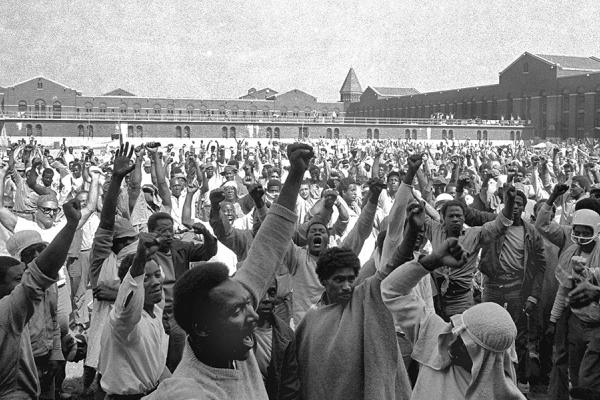“He wants to kill me so bad he can taste it,” Al Pacino’s heated bank robber Sonny Wortzik snarls at encroaching cops during an early stand-off with law enforcement in Sidney Lumet’s simmering 1975 classic Dog Day Afternoon before launching into the film’s iconic, cheer-drawing chant: “Attica! Attica! Attica! Attica! Attica!”
“I’d open every cell in Attica, send ‘em to Africa,” Nas raps, imagining an ideal society, on his famed 1996 collaboration with Lauryn Hill, “If I Ruled the World.”
Tracy Curry admits those two famed pop culture references quantified the near-extent of her knowledge of the Western New York prison in a rural community 30 miles east of Buffalo — and more specifically, the horrific events that unfolded there on Sept. 9, 1971 — before joining forces with veteran filmmaker Stanley Nelson on the Oscar-nominated documentary Attica. She hadn’t even been born yet.
Nelson (The Murder of Emmett Till, Freedom Riders) was around 20 at the time. For at least the past two decades, he had been thinking about making a film about Attica. Early into the project, Nelson realized Curry was hardly alone: “When we first started kind of thinking about the film, we asked our staff, which was like 25 people at that time, who knew about Attica,” Nelson tells us during a recent virtual interview, where he was joined by his co-director Curry. “And easily, a third of the people on the call said they didn’t even know what Attica was.”
As their film depicts in gut-wrenching, agonizing manners, Attica was the site of one of the most tragic, abhorrent stains on American history, particularly involving the U.S. justice and prison systems.
In protest of putrid living conditions, overpopulation, prejudice and inhumane treatment at the correctional facility, over 1,200 inmates revolted on Sept. 9, 1971, taking 42 staff members hostage. Camped out in D Yard, a sprawling exercise field, the prisoners entered into negotiations with lawmakers that lasted over four days. But when negotiations hit a standstill, armed corrections officers and state and local police (under the direction of New York Governor Nelson Rockefeller, who consulted with President Richard Nixon) entered the grounds and indiscriminately fired round after round into the tear-gassed crowd. By the end of it, 43 people were dead: 33 inmates, and 10 guards and prison workers.
In the decades that have passed, the term “Attica” has largely been synonymous with prison “riot,” not “uprising” or “men who revolt over sub-human treatment are systemically executed by law enforcement.” In its powerful and grueling depiction, and featuring interviews with a number of ex-prisoners who were involved or incarcerated there at the time, Attica clears the record.
“We realized people are gonna be really shocked by this story, if we told it,” Nelson says. “Ninety-nine point nine percent of people, even if they knew the broad outlines, they didn’t really know the details of what happened.”
[embedded content]
Among the most repulsive aspects to the story of Attica is the blatant racism that was at play. The majority of inmates, many from New York City, were Black and Latino. The corrections’ staff in rural Attica was all-white and likely rarely interacted with people of color outside of prison walls. A culture clash was already instilled. But in some of the film’s most shocking moments, state troopers and other law enforcement agents are seen and heard yelling “White power!” as they’re about to begin the deadly raid. (You can see as much in this video, beginning at 7:10.)
“If you look at it, you realize they’re actually laughing at what’s about to happen,” Nelson says. “The slaughter of over three dozen people… It’s really chilling.”
Curry sees the individual acts of racism displayed in the film as “branches on this tree, the root of which is, the state’s abuse of power, and the way in which law enforcement was this blunt instrument to reassert the authority of the state.” (The filmmakers say that they initially had three-to-four guards and state troopers lined up to capture interviews with, but all dropped out.)
Attica culminates with viscerally disturbing footage of state troopers raining bullets down on the prisoners (and guards). It also shows the aftermath, in which surviving inmates were stripped of their clothes and marched around prison grounds and forced to crawl through mud, broken glass and human excrement.
Understandably, crafting the film — and spending years with that footage — took a toll on its directors.
“There’s this saying that I’ve heard, ‘What you work on works on you,’” Curry says. “And I certainly found that to be true in the making of this film. It was never far from our minds that we are asking people to revisit a profound trauma. And sitting with people in that, just as a human being, you can’t help but be affected by it.”
“And we were making this film in the middle of everything in 2020,” Curry adds, referencing the Black Lives Matter protests that followed George Floyd’s murder and other high-profile police killings. “And we were all going through a lot of trauma. And so in some ways being in the world of Attica kind of allowed me to silo all the rest of it off. So it was just sort of like a pick your poison thing.”
Attica premiered at the Toronto International Film Festival in September before premiering on Showtime in late-October. It’s drawn raves from critics, many of whom have relayed how shocking and distressing they found it. “Attica utterly devastated me,” wrote Chicago Reader’s Dmitry Samarov. “Jarring, engrossing and enraging,” described Los Angeles Times’ Roxana Hadidi. “A harrowing, infuriating look at racism and the abuse of power by people who see others as inhuman,” stated RogerEbert.com’s Odie Henderson.
“To the extent that it is difficult as an audience to watch this film, and particularly the ending and what happened on the 13th, I do feel like that is sort of the cost of admission,” Curry says. “That is the price you pay for what these people who are in the film and who experienced it are offering… Particularly for the people who were in D Yard, the dates September 9 through 13 every year for the last 50 years are super-triggering and traumatizing. And what we’ve asked for the sake of telling the story is that they relive that and recount that, and what the audience is asking for the sake of learning and being educated about what happened is that they share that. So it almost feels right and proper to me, that [viewers] should feel unsettled and disturbed and changed in some ways by experiencing this film.”
Earlier this month, Attica was nominated for Best Documentary at the Academy Awards where it’s in contention with Summer of Soul, Flee, Ascension and Writing With Fire.
Nelson and Curry, however, can only take so much solace in the film’s success. The New York Corrections Department instituted various reforms following the rebellion in the 1970s, but many of those were reversed during the 1980s and 1990s as prisons grew even more crowded during the “War on Drugs.” Modest civil settlements were reached with surviving inmates and their families, as well as surviving guards impacted and the families of those slain, in 2000 and 2005, respectively.
But to this day there’s been no accountability for the men who opened fire on the inmates and guards, nor the powers that directed it.
“You know, Richard Nixon and Nelson Rockefeller are dead and gone,” Curry says. “So in terms of real accountability and justice, as you hear people say in the film, that has just been elusive for them. And that’s something they’ve had to make peace with, or not. That there is no justice.”




